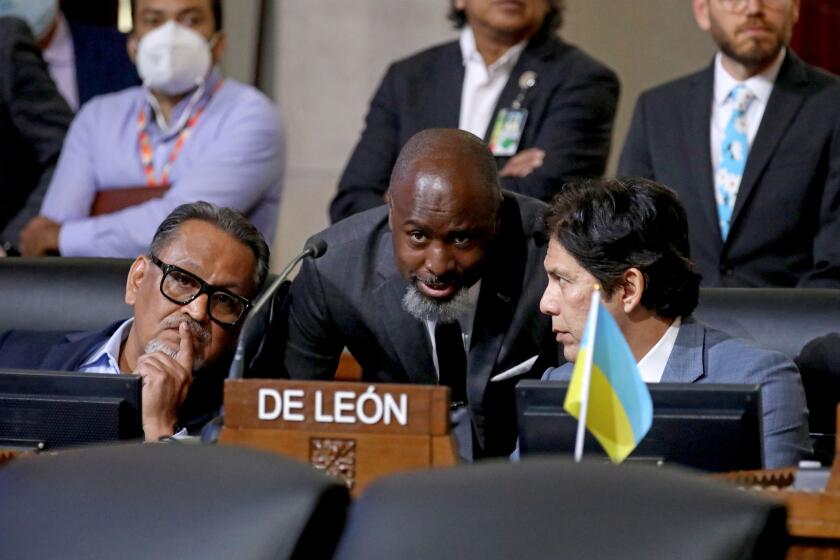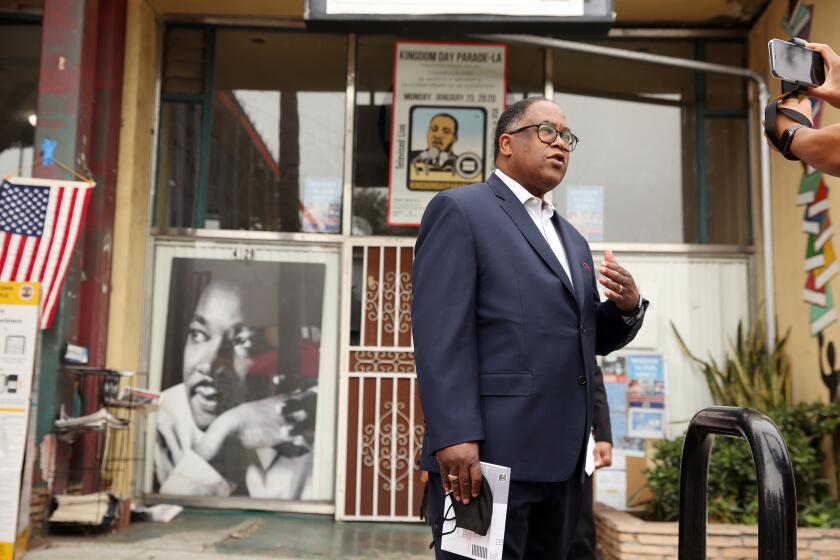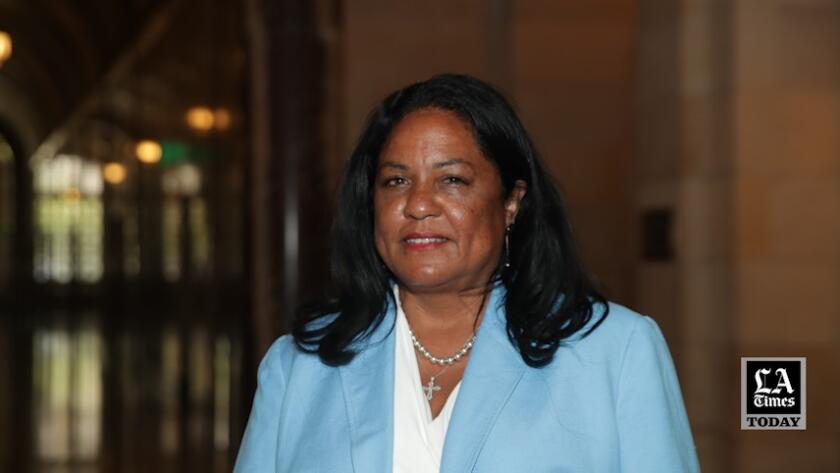Column: ‘I’m a Black woman, not a pawn.’ The forgotten victim of L.A.’s racist tape scandal
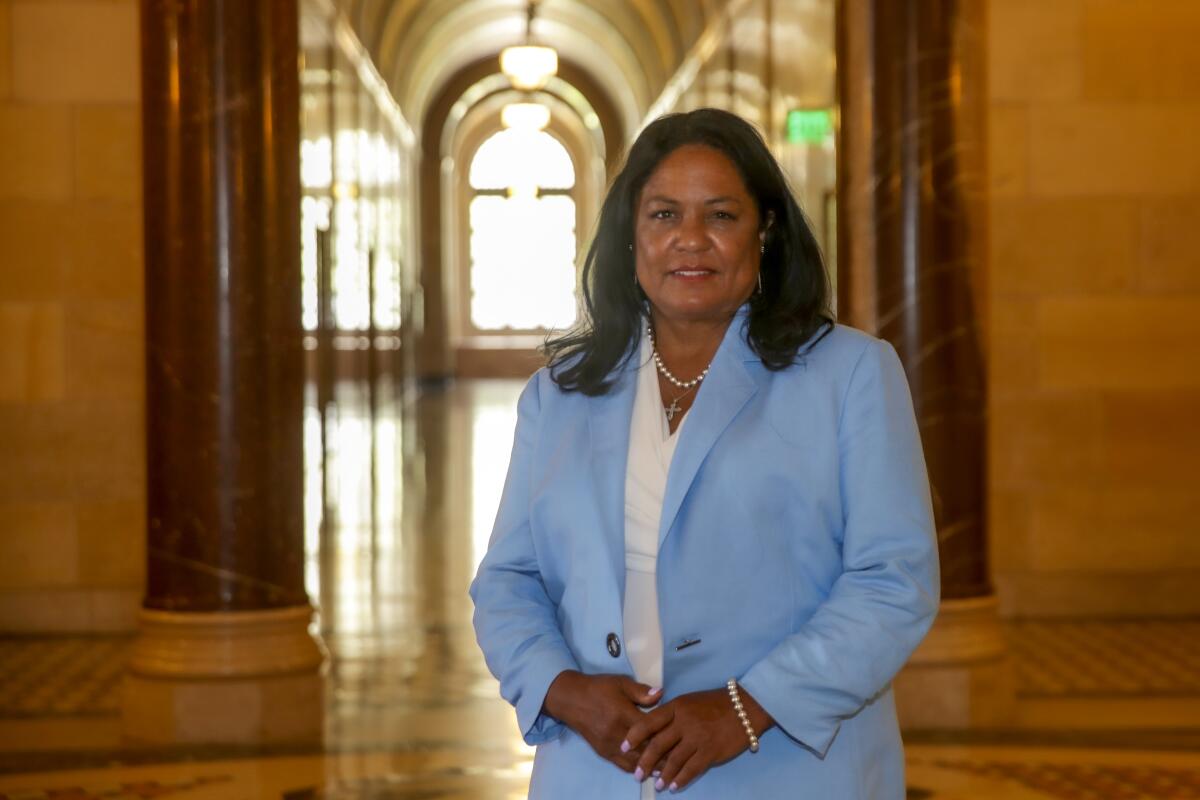
- Share via
Heather Hutt, a longtime political staffer turned interim Los Angeles City Council member, was already disgusted listening to three colleagues and a prominent labor leader use racist language to justify their plot to hoard political power for Latinos.
And then she heard her name.
“The one who will support us is Heather Hutt,” says Los Angeles City Councilmember Gil Cedillo.
“Yes,” agrees Ron Herrera, then-president of the L.A. County Federation of Labor.
“Oooh!” squeals Nury Martinez, then-president of the City Council. “I like Heather Hutt!”
Their words — secretly recorded and leaked — brought on a fresh wave of nausea, followed by shock.
“I couldn’t believe it,” Hutt told me. “I was like, ‘Where did that come from?’”
Indeed, of the many questions that have emerged since my Times colleagues revealed the audio recording of Cedillo, Herrera, Martinez and Councilmember Kevin de León conspiring over redistricting, this is an important one that hasn’t been answered.
Why did these Latino “leaders” believe that a Black woman whose family moved to Leimert Park nearly a century ago would support them and — according to their racist, zero-sum approach to politics — throw Black people under the bus?
“I don’t have any idea,” Hutt told me.
All she does know is that the hateful words and assumptions captured on that leaked recording, spoken by people whom she considered close colleagues, have upended her fledgling political career.
“I’ve had to spend the last couple of days really telling people I’m a Black woman, not a pawn,” Hutt told me, adding: “I’ve been doing this work most of my life.”
It’s no wonder trust in government is hard to come by, especially among Black Angelenos.
Hutt now represents the 10th Council District, which stretches from South L.A. to Mid-City. She is serving as an interim replacement for suspended Councilmember Mark Ridley-Thomas, who is facing trial on federal corruption charges.
In the furor over the racist leaked audio, calls are growing for the city to throw out the boundary lines drawn last year for the council’s 15 districts.
Her nomination to the City Council was championed by none other than Martinez, and backed by Cedillo and De León. But that happened last month, nearly a year after their clandestine redistricting meeting in a bugged, backroom office of the L.A. County Federation of Labor.
Now, Martinez is out, with Cedillo and De León hopefully not too far behind her as political has-beens.
And Hutt has found herself representing hundreds of thousands of Angelenos who, like her, have become collateral damage in the widening scandal that the three of them helped create.
Old fears about voters being disenfranchised have been given new life. Elaborate conspiracy theories about backroom deals and suspicious motives have taken on new credibility. Overall, this has only deepened the sense of betrayal in Black L.A. and heightened worries about the redistricting process, even as there’s talk of appointing an independent commission to redraw the current district maps for the 2024 election.
Gina Fields, like a lot of longtime South L.A. neighborhood advocates, can’t help but think of all the political maneuvering that led up to this moment, much of it starting last October.
“I was like, ‘Oh, my gosh! Mark Ridley-Thomas just got suspended. We’re right in the middle of redistricting,’” she recalled telling her partner. “I was trying not to see any sinister motivations behind it. But now, it’s like, ‘Wow.’”
::
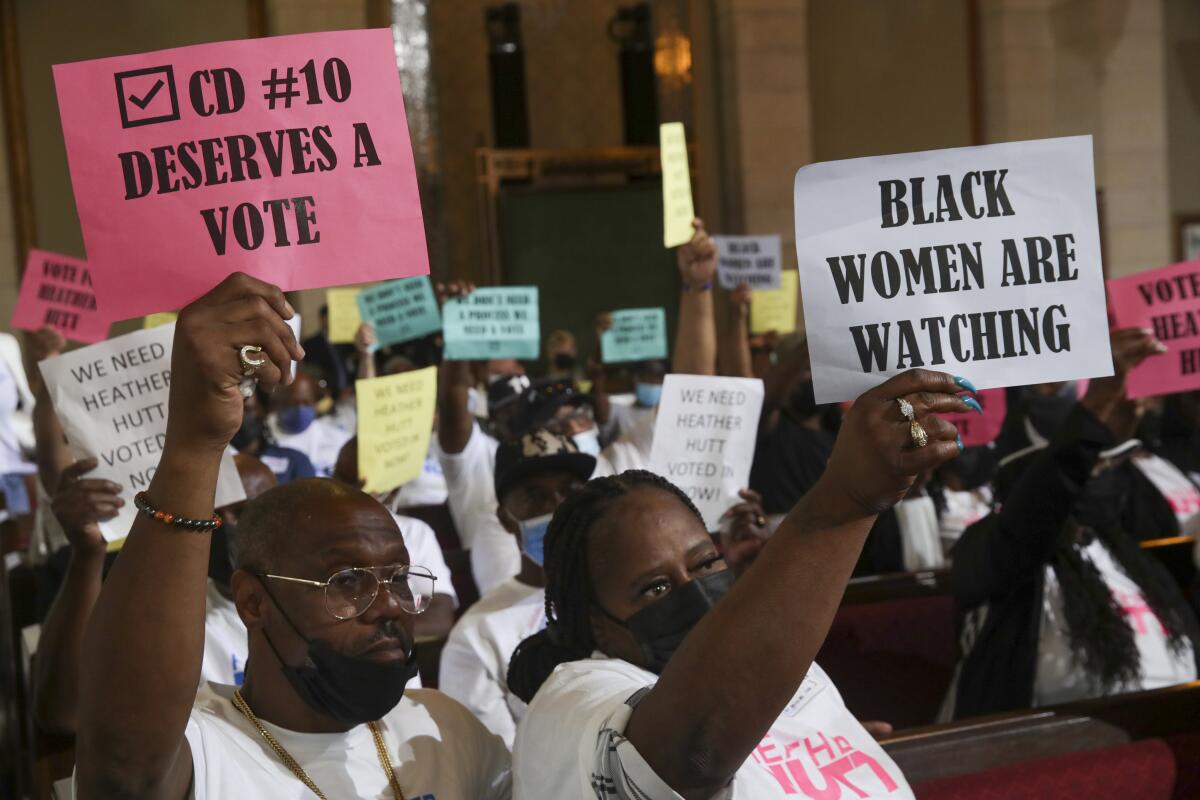
To understand how Hutt ended up in such a complicated situation, you have to go back. Back to when Ridley-Thomas — long considered the dean of L.A. Black politicians — was indicted.
He is facing federal charges for allegedly taking bribes from a USC dean in exchange for directing millions of dollars in public funding to the university when he was on the L.A. County Board of Supervisors. He has pleaded not guilty.
Days after the indictment was announced, Herrera and Councilmembers Cedillo, Martinez and De León had their backroom meeting, briefly discussing whether Ridley-Thomas would step down or fight for his seat.
“If he resigns and the African Americans look at this as a hostile takeover because he’s gone, we’ll have to figure that s— out,” Martinez said. “Because politically, they’re going to come after us.”
Not that optics apparently mattered. Days after that meeting, Martinez moved to suspend Ridley-Thomas.
The backlash in South L.A. was swift. Black pastors held a “citywide prayer service” for the career politician. Black civil rights leaders marched in his defense. Black activists called on the City Council to respect due process and to “withdraw and discontinue.”
It might seem wrongheaded to support a man facing federal corruption charges. But there’s a reason so many were up for it.
First was the prevailing theory that Martinez had pushed Ridley-Thomas off the City Council to remove a key negotiator in the redistricting fight over South L.A.
That, in turn, would allow a fight over redistricting to unfold unchecked between Councilmembers Curren Price and Marqueece Harris-Dawson — two men who don’t always see eye to eye — absent Ridley-Thomas’ moderating influence.
And fight, they did.
Harris-Dawson and his supporters wanted USC, along with nearby museums and stadiums, moved back into his 8th District after a 10-year absence. Meanwhile, Price and his supporters, including Martinez, were determined to keep those assets in his 9th District.
Harris-Dawson’s district is the only one in L.A. where voting-age Black residents are still the majority. The councilmember’s appointee to the city’s redistricting commission, Valerie Shaw, once predicted that redistricting would eventually become “the only venue through which African Americans will have a voice in this city.” The redistricting vote is “about the future of Black folks in L.A.,” she said.
Price’s district, meanwhile, is four-fifths Latino and is seen as likely to elect a Latino councilmember in 2026, once he is termed out.
Ultimately, it’s Council President Martinez who is most at fault for what has gone wrong in the 10th District since Mark Ridley-Thomas was suspended.
Ultimately, it was Price who won the redistricting fight — an outcome the conspiracy-minded among us would say is setting up a future Latino-run district with assets such as USC, while depriving a Black-run district of the same.
“Hearing all these backroom talks now, it really makes you question everyone’s motivations,” said Fields, chair of the Empowerment Congress West Area Neighborhood Development Council. “And question all the choices that were made during redistricting.”
Brenda Ashby, who is on the executive committee of the Crenshaw Manor Community Assn., agreed that because of the recording, people are starting to put pieces together.
“What you were thinking before, you’re hearing that on a tape firsthand,” she said. “Because you knew they were doing something.”
Unfortunately, this is when Hutt enters the story.
In March, under pressure from Fields, Ashby and members of other neighborhood groups, Martinez appointed her longtime ally, former L.A. City Council President Herb Wesson, as an interim replacement for Ridley-Thomas.
Hutt and Wesson go way back. She met him as a teenager and has been close with his family ever since.
She became his chief of staff, but that didn’t last long. The decision to appoint Wesson, which was legally dubious to begin with because he’s termed out, was ultimately thrown out over a lawsuit by allies of Ridley-Thomas.
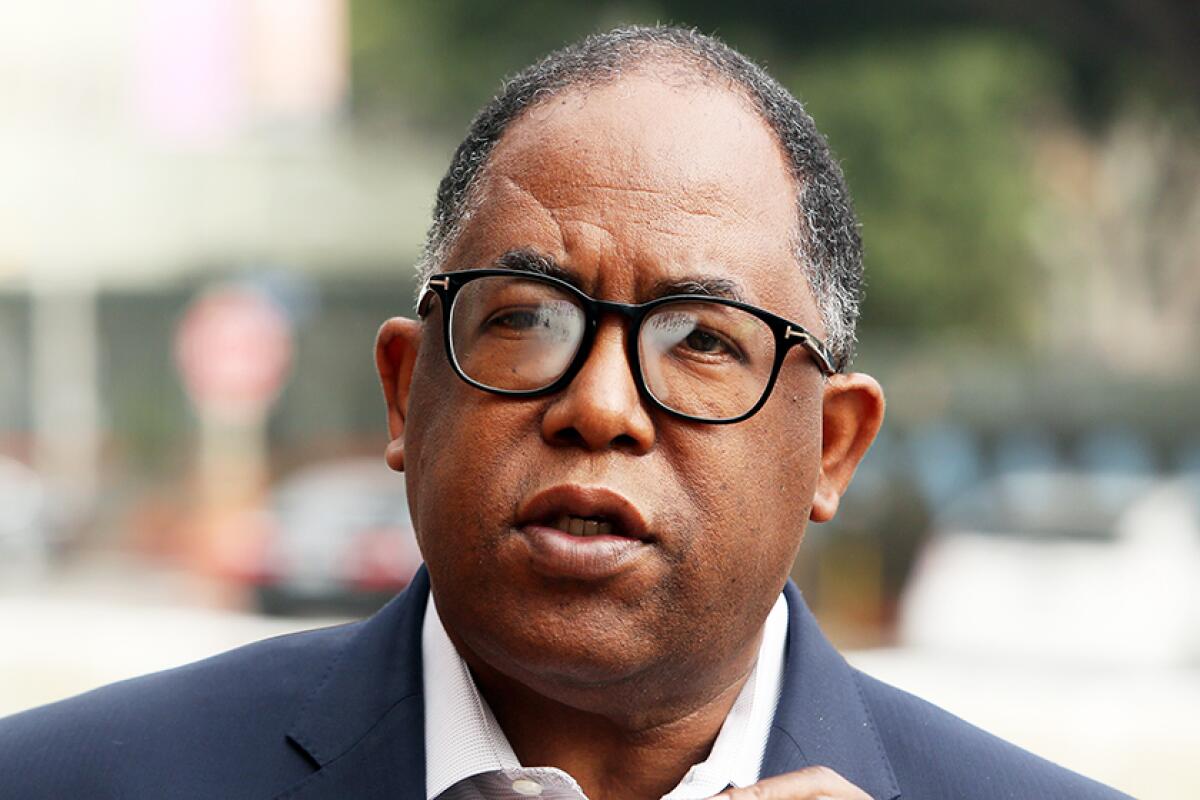
Undeterred, Martinez appointed Hutt to replace Wesson in late August. Some on the council, including Harris-Dawson and Councilmember Mike Bonin, understandably complained about the process and tried to block it, arguing it was forced.
“I object to a process that is engineered to give us a yes or no vote on just one name,” Bonin said at the time.
But by early September, Martinez had managed to get her way. Hutt officially assumed the role of councilmember for the 10th District, as the first Black woman to do so. Hutt was effusive in her praise of Martinez as she was sworn in.
Then came the leaked recording, which put a new spin on everything.
“Folks remember Nury Martinez took the opportunity to basically say I was against a Black woman because I questioned her appointment of Heather Hutt,” Harris-Dawson groused during a news conference last week. “The reason I did that at the time is because what’s on that tape was [already] in the rumor mill.”
Still, it didn’t take long for Hutt to join the chorus calling for Martinez, Cedillo and De León to resign.
Hutt confessed that she never really wanted to join the City Council. After working as a statewide director for Kamala Harris when the vice president was in the U.S. Senate, and losing her bid for a California Assembly seat, Hutt thought she’d land at the U.S. Department of Housing and Urban Development.
But then came Wesson and Martinez, and then the residents of South L.A. and Mid-City, who were desperate for a voting representative on the City Council.
“Honestly, I was answering a call from the community,” Hutt told me.
::
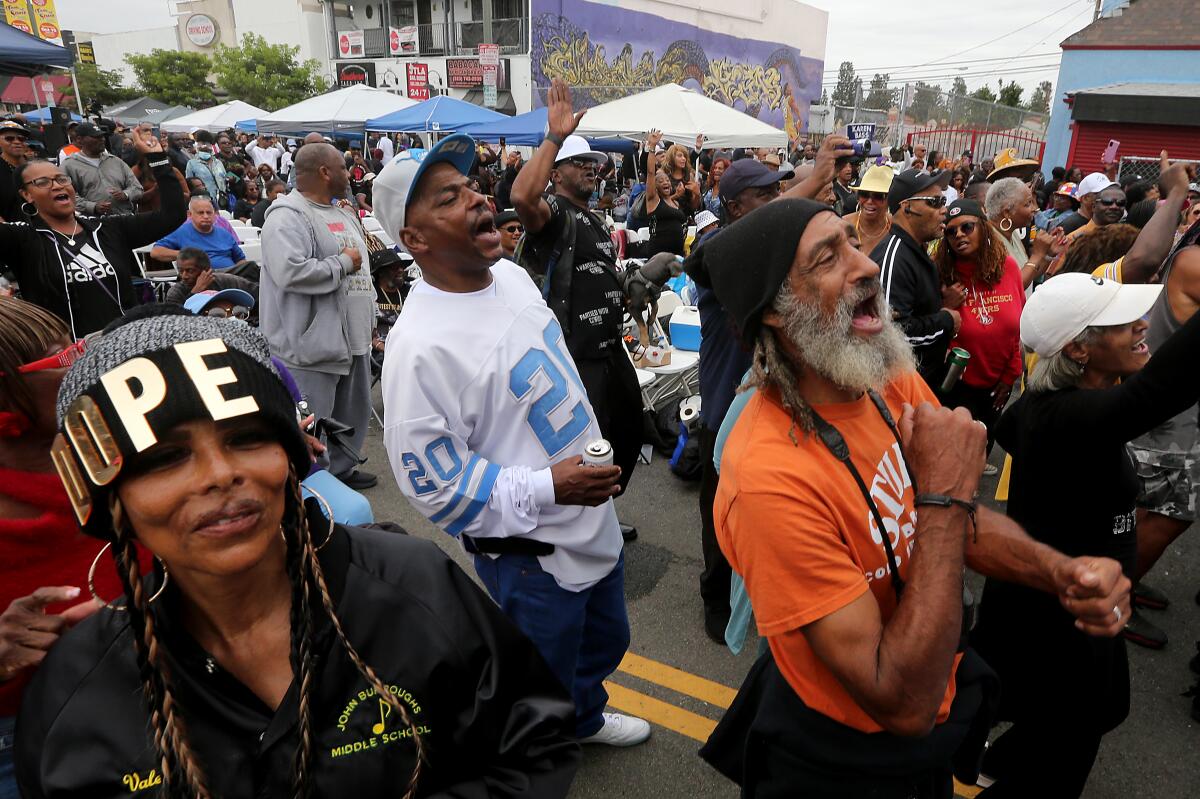
Like the rest of us in Los Angeles, Hutt is still sorting through the politics of the moment.
“I think the majority of the people will understand that she did not have a part to play in that whole thing,” said Ashby, who like Fields has long counted herself among Hutt’s supporters. “And then, there are those that didn’t want her there in the first place.”
Hutt says she is just now hearing the rumors and assumptions that have been so prevalent among the political and activist classes of Black Los Angeles over the last year.
“I’ve always worked in government — before today — as a staff person,” Hutt said. “So I’ve not had cocktails. I’m not going out to dinner. You know, there’s an org chart, and I’m not in that part of the chart.”
She also is navigating betrayal. None of her colleagues — their racist words caught on tape for all of us to hear — has apologized to her.
Over the weekend, she joined Price, Harris-Dawson, Bonin and others in a moment of solidarity onstage at the Taste of Soul festival in Leimert Park. Then she went back into the crowd to talk to residents, to introduce herself and tell her story.
“For those folks that don’t know me, don’t judge me by the rumors,” Hutt said. “Just watch me work, because I’m here to do the work. I’m here for the community.”
- Share via
Watch L.A. Times Today at 7 p.m. on Spectrum News 1 on Channel 1 or live stream on the Spectrum News App. Palos Verdes Peninsula and Orange County viewers can watch on Cox Systems on channel 99.
More to Read
Sign up for Essential California
The most important California stories and recommendations in your inbox every morning.
You may occasionally receive promotional content from the Los Angeles Times.
